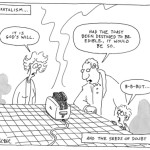We run our website the way we wished the whole internet worked: we provide high quality original content with no ads. We are funded solely by your direct support. Please consider supporting this project.

A Metaphysical Defense of Free Will
Warning: As the title of this post may have already suggested, this post is a bit heady – and a bit long. I’m going to get into some rather tall metaphysical grass as I go about defending free will. But for those who are interested in the free will debate and who are willing to tax their brain a bit, this post may prove worth the time and effort.
First a little background. For the last three months I’ve been involved in a friendly e-mail debate with a brilliant physicist who was once a Christian but who became an atheist several years ago when he concluded that free will was an illusion. I’ll refer to my friend as K, shamelessly borrowing from Kalfka’s great novel, The Castle.
K’s reasoning was that all events, including people’s “free” decisions, have antecedent causes that determine them, or they happen capriciously. But an event that is either determined or that happens capriciously is not free. Hence, K concluded, the concept of morally responsible free will is incoherent.
As an aside, early on in our correspondence I pointed out to K that his conclusion did not necessarily require him to reject Christianity, for some Christians (Calvinists) also deny that people have free will. But K responded that he’d rather be an atheist than bow his knee to a God who predestines all the hideous evil we find in our world. I had to admit that his stance was morally commendable.
In K’s last email to me, he argued that our sense of being free morally responsible agents was an illusion. In fact, he argued,
Virtually all human experiences are illusions…Color, to use one example, does not exist outside of the human brain….It just so happens that the receptors in our eyes are tuned to resonate with EM waves in the frequency band which we call “visible light”.
K argued that we evolved the ability to see color because it was useful. The same is true for all our sense experiences. And, in K’s view, the same holds true for all our internal experiences. We evolved the inner illusion of being free and morally responsible because it was evolutionarily advantageous. What follows is part of my response to K’s argument.
So, K, you say that “virtually all human experiences are illusions,” and you illustrate this (for example) with color. Since color results from the interaction of our eyes with light and has no reality independently of this interaction, you contend that colors “are not ontologically real things.” I would like to raise two objections to your way of assessing what is and is not “ontologically real,” and then I’ll flesh out the implications this has for our assessment of the ontological reality of free will.
First, K, can you see that you arrive at this conclusion only because you assume that particle physics tells us the “real story” about what is and is not “real”? But why should we assume this perspective? Physics gives us one perspective on things, but why privilege this perspective over all other perspectives? Yes, physics tells us that the rainbow wouldn’t exist unless our eyes had the qualities they have, empowering them to interact with sunlight in such and such ways. But why conclude on this basis that the rainbow isn’t “ontologically real”?
I would argue that the rainbow is as “real” as sunlight and human eyes. In fact, I would define the reality of the rainbow as the disposition of sunlight to appear in such and such ways to visual receptors with such and such qualities and in such and such conditions. Why should the fact that this disposition is only actualized in such and such specific circumstances render the rainbow “unreal,” for this much is true of all reality.
The final thing that can be said about every distinct thing is that it is what it is by virtue of how it is disposed to interact with every other distinct thing in such and such conditions. We can wonder what X would be like in isolation from everything else – what Kant called the ding an sich (“thing-in-itself”) – but we can form no conception of it for, among other considerations, we can only conceive of X by imagining ourselves interacting with X! Which brings me to my second objection.
It seems to me that this holds as true in physics as it does for everything else. We only know particles by virtue of interacting with them (which generated Heisenberg’s Uncertainty Principle, as you know). What it means to be particle X is, at its base, nothing more than this: we generate such and such responses on our measuring devices in such and such circumstances. When we refer to particle X, all we mean is that reality is disposed to act in such and such ways under such and such conditions as measured by our devices. And notice, our measuring devices and measurements are nothing more than the fact that reality is disposed to interact with our senses in such and such ways and under such and such conditions.
You see where this is going, don’t you K? If we slap the “illusion” label on everything that is “real” only by virtue of our interacting with it, then we have to accept that everything physics deals with is also an illusion. Unfortunately, this was the standard of reality you appealed to when you judged virtually all human experience to be an illusion. And so, K, it seems to me your reasoning process has undermined your standard of reality against which everything else was judged an illusion, thus leaving you with no criteria to assess anything, including human experience, to be an illusion.
In short, K, I would argue that your perspective is a) arbitrary, inasmuch as it privileges one perspective (physics) on reality over other perspectives, and 2) self-defeating, inasmuch as it saws off the only branch of reality you had to sit on.
Allow me to offer up for your consideration an alternative approach, which I’ve already hinted at. Instead of starting from a position that leads us to conclude everything that is disposed to interact with us is an illusion, why not start with the assumption that everything that is disposed to interact with us is real? In fact, I suggest we define “reality” as the set of all interactional dispositions.
This is, after all, all we really know. To know X is to know how X is disposed to interact with every other distinct thing in such and such conditions. We might call this perspective a phenomenology of interactive dispositions, and if we assume this perspective, we can see that there is no basis for privileging one set of interactional dispositions (physics) as telling “the real story” and then judging all other sets of interactional dispositions to be “illusions.” There is only reality, which is to say, there are only interactional dispositions.
This doesn’t mean we can’t talk any longer about “illusions,” such as when a child imagines they’re seeing a ghost lurking in the corner of their bedroom. But “illusion” must always be contextually defined. When we say the ghost is an “illusion,” we mean that no other person would see it if they were in the bedroom. The way reality is disposed to interact with this child in these conditions doesn’t correspond to the way reality is disposed to interact with all other people in those or similar conditions. Hence we conclude that things are going on in the child’s mind that caused him to see this “illusion”. To be sure, the ghost is real, just real in a way that fails to correspond to everyone else’s perception of reality, and thus is defined, in a social context, as “illusory.”
But by the same token, when everyone experiences the same thing in the same or similar conditions, this must be accepted as real. And since everybody (even determinists) experience themselves as free moral agents, this means that free will is real. If the perspective I’m advocating is accepted, it entails that our experience of ourselves as agents who originate new lines of causation – who make choices that are neither pre-determined nor random – must be allowed to form our understanding of reality as much as the perspective of physics.
To make the same point another way, within the metaphysical framework I’m advocating, it would be arbitrary to assume that the way reality is disposed to interact with humans that we call “being a free morally responsible agent” can be adequately understood by reducing it down to the framework of the interactional dispositions that define physics. This perspective, in other words, bucks up against the foundational Enlightenment reductionist assumption that the we only understand X when we’ve reduced it to its smallest constituent parts.
This assumption is at work when you insist that determinism and capriciousness exhaust the possibilities (based on the assumption that physics tells “the real story”), which is tantamount to assuming that morally responsible free will doesn’t exist. But K, you experience yourself as an originator of new lines of causation that is neither predetermined nor random. While we can’t fully understand it within the framework of physics, that experience is as real as anything could be! Indeed, it’s at the heart of your experience of being human!
Yet, your reductionistic Enlightenment assumption requires you to force this experience of freedom into the Procrustean bed of antecedent causes and to thus judge it to be illusory. As I’ve argued, this is not only arbitrary, it’s self-defeating, for the same logic that leads you to judge your free will to be illusory must also lead you to judge physics to be unreal and to end up judging all reality to be an illusion – but without even a standard of reality to measure it against.
In the end, K, I’m simply encouraging you to allow the whole of reality as you experience it to inform your understanding what is real instead of allowing one vantage point on reality (physics) to undermine the reality of every other vantage point. I look forward to hearing your response to my metaphysical musings.
Your friend,
Greg
Photo by Harold Laudeus on Visual hunt / CC BY-ND
Category: General
Tags: Determinism, Free Will, Metaphysics
Topics: Free Will and the Future
Related Reading

Henry’s Mom: Did God Author This?
Many of you were touched last month when we featured some reflections on little Henry’s death. Well, Henry’s mother Jess has started a blog to process through some of her thoughts and we wanted to share this amazing piece with all of you. Jess thinks ahead to the time when her two-year-old daughter will start…

Does God Intervene?
Given the vast influence of angelic and human free will, what influence does God have in determining what comes to pass? While God has an important role to play in anticipating and creatively responding to decisions agents make, is God only a responder? Does he have anything to do with what’s going on in creation?…

God’s Regrets and Divine Foreknowledge
One aspect of the portrait of God in Scripture that suggests the future is partly open is the fact that God sometimes regrets how things turn out, even prior decisions that he himself made. For example, in the light of the depravity that characterized humanity prior to the flood, the Bible says that “The Lord…

How People Misunderstand Open Theism
Open theism holds that, because agents are free, the future includes possibilities (what agents may and may not choose to do). Since God’s knowledge is perfect, open theists hold that God knows the future partly as a realm of possibilities. This view contrasts with classical theism that has usually held that God knows the future exclusively as a domain…

If every effect has a cause, how can there be free choice?
The most common argument given in defense of determinism is that it’s implied in the nature of causation. Every event has a cause, and this cause accounts for the event being the way it is. This cause must itself have had a cause that accounts for it, and so on ad infinitum. Hence, everything must…

